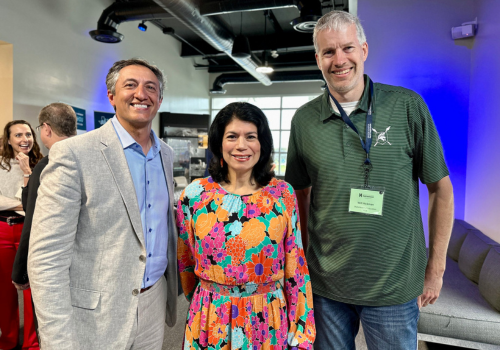Legislative Session Update: Week 18
Published May 10, 2019 by Taylor Landin
During the 86th Legislative Session, the Partnership will provide a weekly update on our top executive priorities and other newsworthy items from Austin.
This week, the Texas House ran into the first series of end-of-session deadlines. Public school finance reform legislation is heading to conference committee after the Senate passed House Bill 3 on Monday. The Partnership also led efforts to pass a workforce development bill off the House floor.
PARTNERSHIP EXECUTIVE PRIORITIES
SCHOOL FINANCE REFORM
This week, the Texas Senate considered House Bill 3 by House Public Education Committee Chairman Dan Huberty. Over the course of Monday afternoon, members of the Senate approved about 40 amendments to the legislation. Several major concerns dominated the debate: a potential move to current year property values rather than prior year property values to calculate school district funding, a $5,000 across-the-board pay raise for full-time teachers and librarians, incentive funding for third grade literacy, teacher merit pay, and the STAAR assessment and its use as a measure in teacher evaluations. The legislation was eventually passed 26-2. Three Senators were present, but did not vote for or against the legislation, citing concerns with the lack of information regarding the total fiscal impact of the legislation on the state.
Major provisions include:
- $5,000 across-the-board pay raise for all full-time teachers and librarians
- Outcomes funding for third grade reading and college, career and military readiness
- Funding for full-day pre-K for all eligible four-year-old students
- Strategic teacher compensation with funding provided for merit and incentive pay
- An increase to the special education funding weight
- A pilot program to develop a formative assessment as an alternative to STAAR
- 2.5 percent local school district maintenance and operations revenue cap
- Move to current year versus prior year property tax values
The bill now heads to conference committee, a process that includes the appointment of five members from both the House and Senate to negotiate the differences between the House and Senate versions of the bill. The conferees include:
House Conferees: Representatives Dan Huberty (R-Kingwood), Trent Ashby (R-Lufkin), Ken King (R-Canadian), Mary Gonzáles (D-Clint) and Diego Bernal (D-San Antonio).
Senate Conferees: Senators Larry Taylor (R-Friendswood), Jane Nelson (R-Flower Mound), Kirk Watson (D-Austin), Royce West (D-Dallas) and Donna Campbell (R-New Braunfels).
The conference committee held its first meeting on Friday. Once a majority of conference committee members agree to a version of the bill, it will go to the full House and Senate for final approval.
FLOOD RESILIENCE
Severe weather in the Houston region this week was a reminder of the importance of passing flood mitigation legislation this session. Negotiations between the key leaders on this issue continue behind the scenes. As we shared last week, the House Natural Resources Committee passed Senate Bill 7 by Senator Brandon Creighton (R-Conroe). Now that the deadline has passed to hear House bills on the House floor, we anticipate the House will take up SB 7 in the coming days. Following that move, the conference committee will need to come together to agree upon the final legislation.
WEEK IN REVIEW
Workforce Development
House Bill 3511, authored by Representative Gary VanDeaver (R - New Boston), creates the Commission on the Texas Workforce of the Future and was passed by the House on Thursday. The State of Texas faces an aging workforce and suffers from a lack of qualified individuals to fill high-need industry jobs and careers. This bill, which the Partnership strongly supports, would be the first of its kind to bring together leaders from Texas' five main business sectors, as well as representatives from the K-12 and higher education institutions, state agencies and legislators, in order to develop a strategic plan for Texas' workforce needs into the future. Now that the bill has passed the Texas House, it moves to the Senate, where Senator Carol Alvarado (D - Houston) will be its sponsor.
Economic Development – Chapter 312
The Senate Committee on Natural Resources and Economic Development took a step towards reauthorizing the Chapter 312 economic development program. House Bill 3143 by Representative Jim Murphy (R-Houston) was heard on Wednesday morning, and it received strong support from the business community. As discussed previously, the Chapter 312 program allows cities and counties to offer 10-year property tax abatements to spur economic development. Chapter 312 will expire this September unless reauthorized by the Legislature. Representative Murphy’s bill extends the Chapter 312 program for another 10 years and increases reporting and oversight requirements. One of those provisions, a 30-day public notice before a city council hearing, raised some concerns regarding potential breaches of non-disclosure agreements and opportunities for competitors to abuse the process. Overall, however, the business community testified in strong support of increased transparency for this important program. We expect concerns regarding the 30-day notice to be addressed in the next two weeks.
Health Care – CPRIT
The Cancer Prevention and Research Institute of Texas (CPRIT) was originally approved in 2007, and its grants have since helped create thousands of jobs, generated billions of dollars in economic activity, encouraged biotech companies to expand or relocate in Texas, and supported world-renowned scholars, including a 2018 Nobel Prize recipient. House Bill 39 and House Joint Resolution 12 by Representative John Zerwas (R - Richmond) are necessary to maintain the current CPRIT program. HB 39 allows for grants to continue to be awarded past the original statutory deadline, and HJR 12 proposes a constitutional amendment allowing for an increase to the maximum bond amount authorized for CPRIT. Both bills passed out of the Senate this week and will be sent to the Governor’s desk.
Stay up-to-date with our Policy Team throughout the 86th Legislative Session by opting-in to this weekly update or follow the team on Twitter @GHP_Policy
 The Houston Report
The Houston Report




















